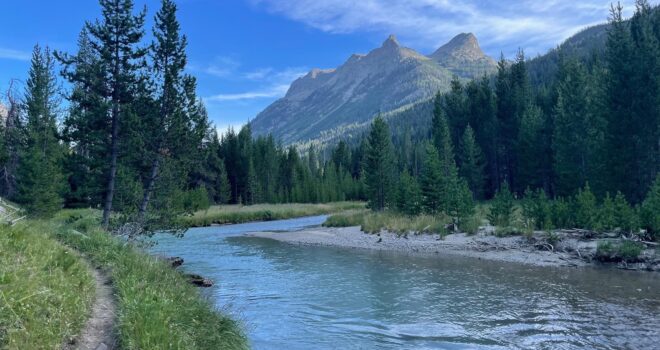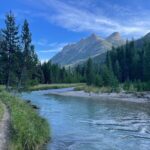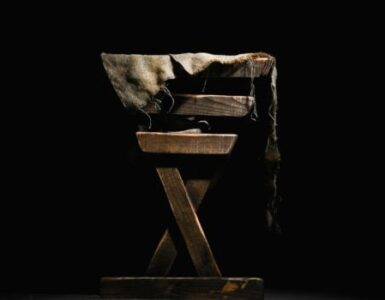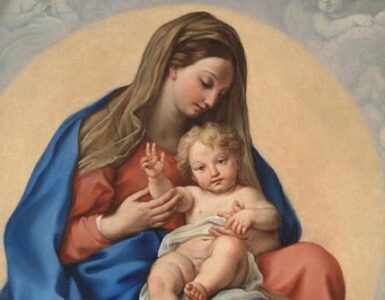“And though the last lights off the black West went /Ah morning, at the brown brink, eastward springs.”[1] I stood as a jaded witness to these “last lights” and the oncoming blackness of night. The springing of dawn was seemingly an eternity away—too far for my short leash of hope. It was that time of day when everything seems to take a deep breath, look over its daily adventure, and yawn with exhaustion at the unchanging cosmic cycle. Such a description was no injustice to my own state, and I walked among the towering Cottonwoods and sprawling fields of rural Nevada with a deep sense of emptiness. The days had been dragging on, and this one was particularly sluggish. It had been a year since I became a student at Wyoming Catholic College and had plunged into the wilderness on the rigorous 21-Day Freshman Expedition. I had soared through my freshman year without pause, without a moment to reflect on the true weight of my experiences. But at this moment, back at my childhood home, I could sense that something had profoundly changed within me. The path I walked had seen my weary feet countless times throughout the distant decades of my youth. Every twisted tree, every forlorn pothole and rut, was a landmark within the realm of my memory, summoning a whole world of past experiences and emotions. Yet this time, after a year of novel experiences and unexplored emotions, the familiar dirt road became a mysterious symbol of the transformation of my own heart, revealing the unimaginable grace God had given to me through a small Catholic school in the mountains of Wyoming.
The towering trees that lined the road encircled me overhead, reaching out their immense arms with intentions I could not discern. Was this the kind embrace of a comforting friend? Or the overshadowing of captivity and hostility? This ambiguity highlighted the intense strife that was painfully unmistakable within my own mind. Amid the peace and tranquility of my surroundings, the softness of the golden sky, the refreshment of the cool air, and the soothing flutter of summer leaves, my mind was at war. What was I feeling? Why all this pain? In this moment, the dominant faction in mysoul was a sense of loss—the poignant grief of loneliness. There was a hole in my heart, a gaping target for the pangs of this world to take their careful aim. I labored under a constant feeling of claustrophobia—of futilely wanting to share my life stories with someone who truly cared. The agony of this impossibility tainted my whole world, making every experience a ghostly dream, lacking reality’s customary anchors. I had lost my foundation. And yet, there was something in the sunset that challenged this viewpoint—that was gently tugging my sleeve and leading me towards a different perspective. For a long while, this mysterious attraction was obscure, and failed to resolve the conflict in my spirit. But suddenly, the gentle tug became an overpowering force—as when a small child finally loses patience with his distracted parent and asserts his will with all the childlike authority he can muster.
A materialist might describe this force in terms of chemical reactions occurring in my neck muscles as I casually turned my head, unthinkingly desiring to further observe the landscape around me. But contrary to this reductionism, the movement was poetic and almost providential. As I turned back to examine my lonely road, my eyes wandered over the humble marvels of my environment—the unimposing yet giant trees, the flaming evening sky, the shockingly defined silhouettes, and the quiet desert greenery. The small voice that had been whispering into my deaf ear finally revealed itself. A wave of undeniable clarity crashed upon me with the force of a tsunami. And yet, I was not drowning; it was a tide that somehow bore me up and lifted my lowly being to new heights. I was riding atop the surf, being carried by a mysterious current to an even more mysterious destination. In this moment, I realized that the one who had been tugging my arm was nothing like a child—but instead one whose child I was.
The curtain finally fell to the ground, and my eyes were briefly opened to the Light of the World.[2] I felt the immense weight of the divine Presence—but for once not as something that was resting on my shoulders. No, in this instant I was resting on His Shoulders—rejoicing in the depth of His Reality and the stability of His arms. Looking back on the path I had walked, on the beauty I was witnessing, on the “last lights” of the west, I realized that they were all for me. The Spirit was drawing me into His “warm breast”—embracing me with His “bright wings.” The loneliness of the past few days receded into a mere echo at the rear of my consciousness—pushed back by the transformative recognition that I was never alone. The wonder and splendor I was enjoying was not something I needed to share, not something that needed to be urgently justified by the affirmation of another. This was something I needed to simply stand and watch, opening my whole being to the unquestioning acceptance of a transcendent gift—Creation. I did not need to take a picture—I did not need to run and find someone who would be impressed by my proprietary experience of some trivial beauty. I had simply to stand still, to allow the loving arms of my God take me up into the most powerful companionship I will ever experience. This scene was my gift—and in that moment my entire existence revolved around one desire: being with the Giver.
Usually people say the phrase “my life flashed before my eyes” in connection with a near-death experience. The emotion of intense fear brings to light the stark reality of our mortal existence, and the inevitable failures and stumbling’s that accompany it. In this exuberant moment beneath the Cottonwoods, I experienced a similar phenomenon. My life flashed before my eyes. Nonetheless, it was an altogether different image—a different flash of illumination that would change my outlook on the world. This was not the dreaded remembrance caused by impending doom. It was not the product of fear or aversion. Instead, this “flash” was a penetrating reevaluation of my whole life—past, present, and future. I realized, with an almost distrustful joy, that my existence was not merely a point in an endlessly vast universe. “Think of the whole of existence, of which you are the tiniest part; think of the whole of time, in which you have been assigned a brief and fleeting moment; think of destiny—what fraction of that are you?”[3] These words of Marcus Aurelius, which had been lurking in my consciousness for weeks, retreated unnoticed with the loneliness that was quickly fleeing from me. My life was one where the Greatest of All Beings cared for me with an infinite love. Every moment of my experience was a providential gift from God—and all was somehow meant for me. Needless to say, this was a transformative realization, and one that gave transcendent meaning to my entire worldview. We are real—we matter—we are good.
Moments like this sunset under the Cottonwoods reveal to me why God sent me to a small liberal arts college in the desolate rangelands of Wyoming. These moments are the priceless fruits of an utterly unique education. Wyoming Catholic College charges its students to study, to contemplate, to research––but also to walk, to camp, and to live in the beauty of the real world. Spending nearly seven weeks in the wilderness during my first year at Wyoming Catholic College made me come home, back to my lowly dirt road, with a soul forever changed. My time in Wyoming taught me that it is not within a carefully curated National Park or inside a commercialized art gallery that we have the most powerful experiences of beauty. No—beauty is in the normal places, the dirt roads and muddy fields of this unexpectedly miraculous planet. It is when we are truly within “the world”—truly within the genuine experience of a human being—that we finally realize “the world is charged with the grandeur of God.” [4]
[1] “God’s Grandeur”–Gerard Manly Hopkins, 1877
[2] RSVCE, John 8.12
[3] Meditations, Marcus Aurelius, trans. Martin Hammond
[4] “God’s Grandeur,” Hopkins, 1877
Photo by Dillon Groves on Unsplash












